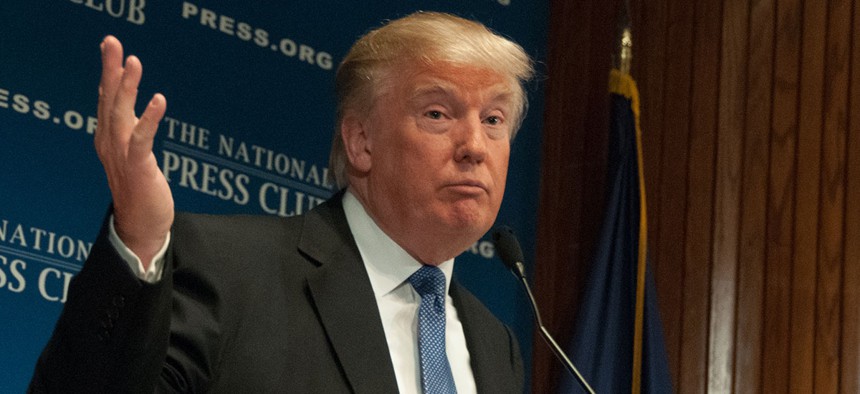
Albert H. Teich / Shutterstock.com
It's safe to assume Donald J. Trump has very high self-esteem.
Who else but Trump would take complete credit for making immigration a talking point during the first GOP debate? (it's a GOP debate! Of course immigration will be mentioned!) Who else but Trump could answer the question, "What was the last thing you apologized for?" with: "It was too many years ago to remember. I have one of the great memories of all time, but it was too long ago."
Trump is breaking every convention of presidential politics—flaunting his unapologetically egotistical, politically incorrect style—and baffling pundits in the process. Trump is oftenlampooned for this, but maybe the joke's on everyone else. His grandiosity appears to be working. By force of personality, Trump is taking an idea as far-fetched as a competitive Trump presidential bid and turning it into glittering reality.
W. Keith Campbell is less shocked than the pundits. While not admitting to being a narcissist himself, Campbell is one of the foremost narcissism researchers in the United States, having authored dozens of academic papers and some books on the topic.
"Narcissism is about being grandiose," he says. "It's about being better than people: I'm better, I'm stronger, I'm more special, more important."
In the lab, Campbell has seen how narcissistic subjects come to dominate group task assignments. He was also apart of a team that studied historical levels of narcissism in American presidents and found evidence the personality trait correlated with effectiveness in office.
So what can politicians learn from narcissism research? Campbell explains below in this lightly edited interview.
(And keep in mind, although Trump stands out in self aggrandizement, any person running for president is sure to score high on a narcissism assessment scale. "That's a job requirement," Campbell says. "You have to think, 'I should rule the free world.'")
Whether politicians are truly narcissistic or not, we often see them—particularly Trump—project a narcissistic persona. Are there benefits to projecting narcissism in politics?
People who are narcissistic are often propelled into these positions of leadership. They rise to leadership. In leadership research, we often look at emergent leadership [how people become leaders] and then success as a leader. What narcissism predicts really well is emergent leadership. People who are narcissistic are good at becoming leaders. In part, because they want to, and in part, because they project confidence that people want.
Once they get to leadership positions, it's a real mixed bag. There are positives and negatives.
What are some of the down sides?
It's a really interesting story with narcissism and leaders. There's some work showing a trade-off between risk and narcissism. Meaning that leaders who are narcissistic are willing to take a lot of risks—big, public risks. When it works, they look like heroes. When it fails, they blame everybody and go to another job. You see this in a lot of corporate situations, when a narcissistic leader comes in and makes massive changes. That's what everyone is scared of when they get a new boss.
Another trade-off we see—and we see this in our historical work on presidents—is ethics. Based on historian ratings, we see presidents who were very narcissistic like [Lyndon] Johnson and [Richard] Nixon, who made big changes but also had ethical issues that went with it.
Are there benefits to being a narcissistic outside the realms of politics and leadership?
There's a very similar pattern you see in both romantic relationships and leadership positions. People who are narcissistic, they find more relationships, more romantic relationships. They tend to be seen as attractive. They tend to be liked initially. And then their relationships often have ethical problems down the line: infidelity, manipulation, control issues.
What in your opinion is the ideal personality of a leader?
It's really challenging, because part of it depends on the context. If you are in a highly functioning organization in a good economy, you want someone who is an ethical manager to keep it going. What happens in very unstable economic climates is that people often look to strong leaders. And leaders who appear strong appear narcissistic. [Vladimir] Putin is a great example. He does a lot of self-promotion.
The key to [effective] narcissism: Can you turn it off when you are listening to your advisers? Then it works. But when you are so narcissistic you can't take advice from people, you ruin your relationships with your friends, your family. Then people won't trust you. Then it can be very destructive.
(Image via Albert H. Teich / Shutterstock.com )







